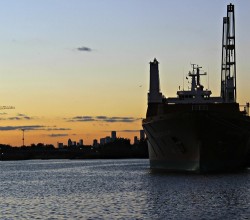COMMENT OF THE DAY: WHAT MADE THE GEOGRAPHY THAT MADE HOUSTON  “Air conditioning had little to do with it. Chicago out-paced Houston because of its location as the geographic nexus of industrial transportation during the industrial revolution. It connected to the east through the Erie Canal and Great Lakes and to the west with the ever-growing railroads. A linchpin city grows. A growing city builds. Houston had no such geographic importance — and had a hurricane not made Galveston nonviable, Houston would probably still be a modest town. We had to build our port to earn any geographic value. It’s impressive that we did so. Houston shouldn’t exist. We made it exist. Now that’s cool.” [Matt, commenting on Comment of the Day: When Houston Chilled Out and Grew Up] Photo of Houston Ship Channel: Russell Hancock via Swamplot Flickr Pool
“Air conditioning had little to do with it. Chicago out-paced Houston because of its location as the geographic nexus of industrial transportation during the industrial revolution. It connected to the east through the Erie Canal and Great Lakes and to the west with the ever-growing railroads. A linchpin city grows. A growing city builds. Houston had no such geographic importance — and had a hurricane not made Galveston nonviable, Houston would probably still be a modest town. We had to build our port to earn any geographic value. It’s impressive that we did so. Houston shouldn’t exist. We made it exist. Now that’s cool.” [Matt, commenting on Comment of the Day: When Houston Chilled Out and Grew Up] Photo of Houston Ship Channel: Russell Hancock via Swamplot Flickr Pool





“Houston had no such geographic importance — and had a hurricane not made Galveston nonviable, Houston would probably still be a modest town.”
B.S. Houston was in the process of overtaking Galveston prior to the hurricane. Houston was on the main rail line, and Galveston merely at the end of a spur. Railroads were king back then.
Yeah I also call BS. It really isn’t that much of a stretch to look at a map and see how access from points east to points southwest (or south or southeast, including Galveston) is far more efficient via Houston than the alternatives. There does exist a subtle kink in the infrastructure here. Houston was always destined to be something greater than a Beaumont or a Mobile. Put that together with a major inland port and indeed you’ve got the fundamental makings of a large city; but it wasn’t necessarily destined to become the huge city it is until it cornered the market on oil and gas headquarters and experienced its post-WW2 booms…and to that end, yes, air conditioning may have been important.
.
But the thing that gave Chicago a distinct advantage, more than anything, is that it was an older city in the north which was a trans-shipment point between rivers and lakes. It received greater investment at an earlier date, and the regions surrounding it weren’t devastated by the Civil War. Being an incumbent city is often advantageous…though not always.